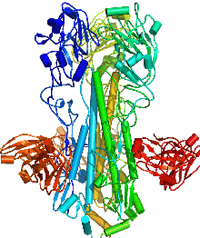High school students’ interactions provide new look at disease transmission

Graphic showing the flu virus and its antibodies. Image credit: NIH
It’s colds and flu season, and as any parent knows, colds and flu spread like wildfire, especially through schools.
New research using human-networking theory may give a clearer picture of just how, exactly, infectious diseases such as the common cold, influenza, whooping cough and SARS can spread through a closed group of people, and even through populations at large.
With the help of 788 volunteers at a high school, Marcel Salathé, a biologist at Penn State University, developed a new technique to count the number of possible disease-spreading events that occur in a typical day.
This results are published in this week’s issue of the journal Proceedings of the National Academy of Sciences. (more…)
Read More


